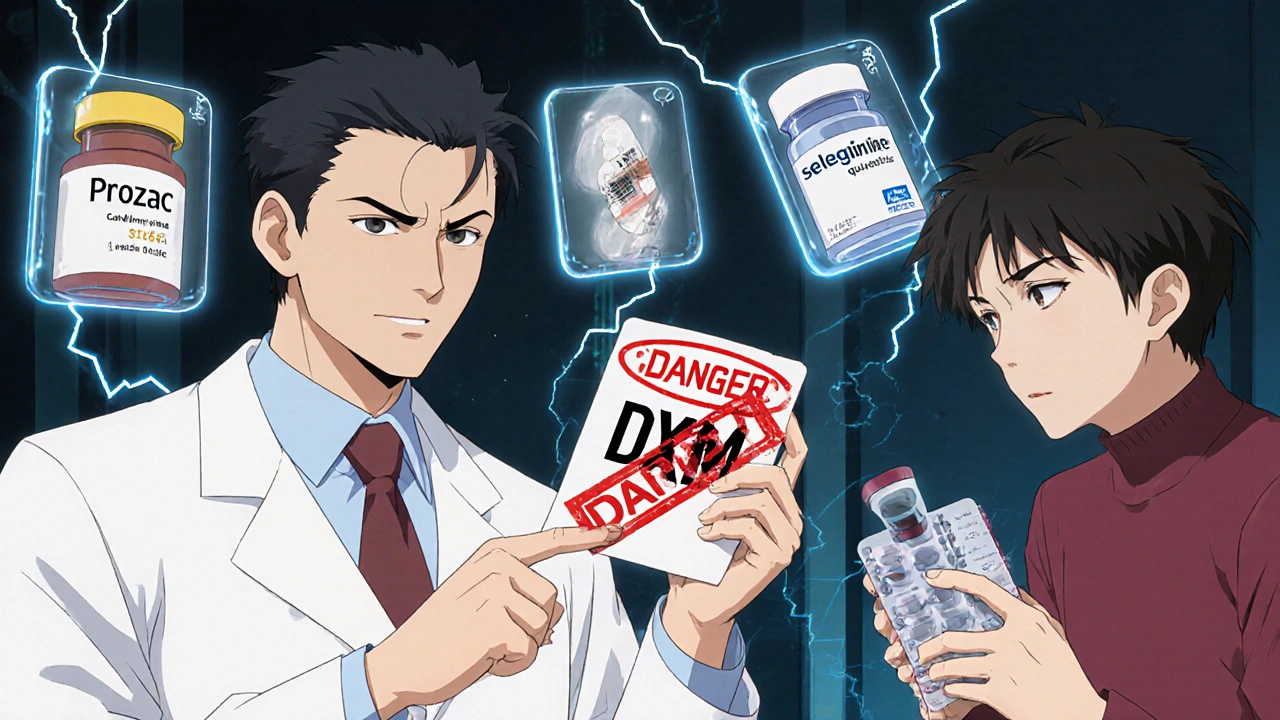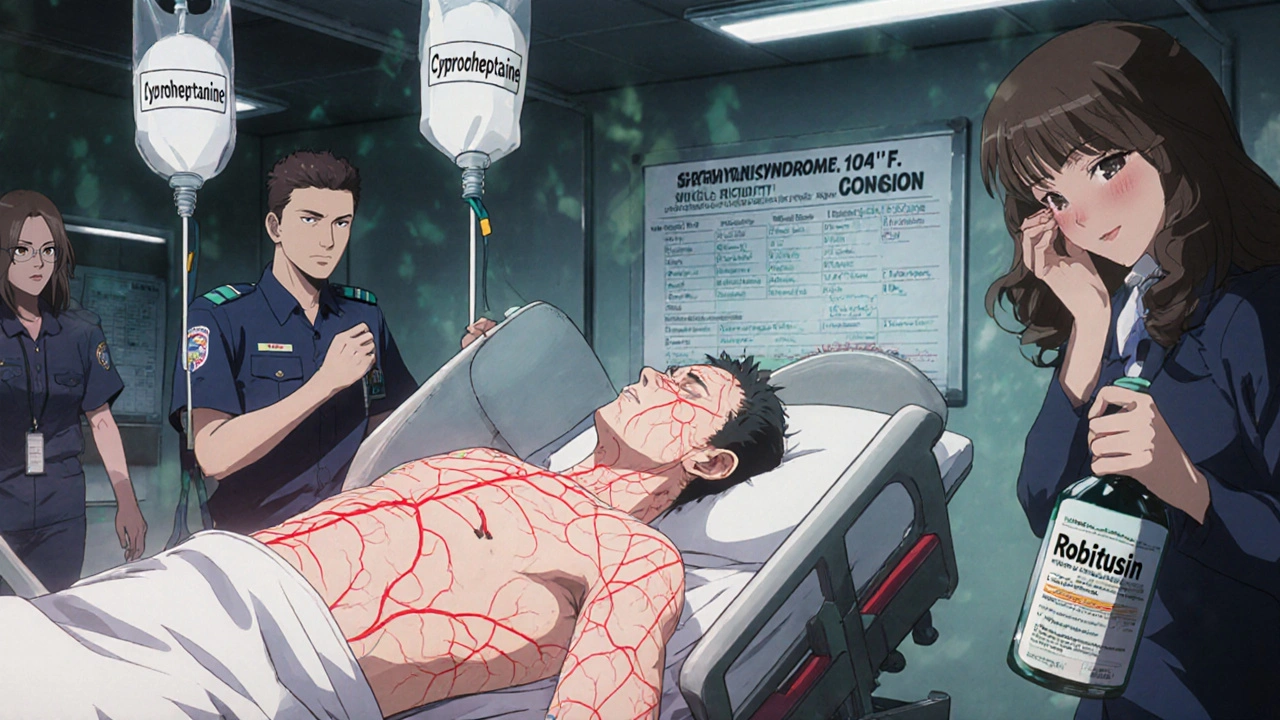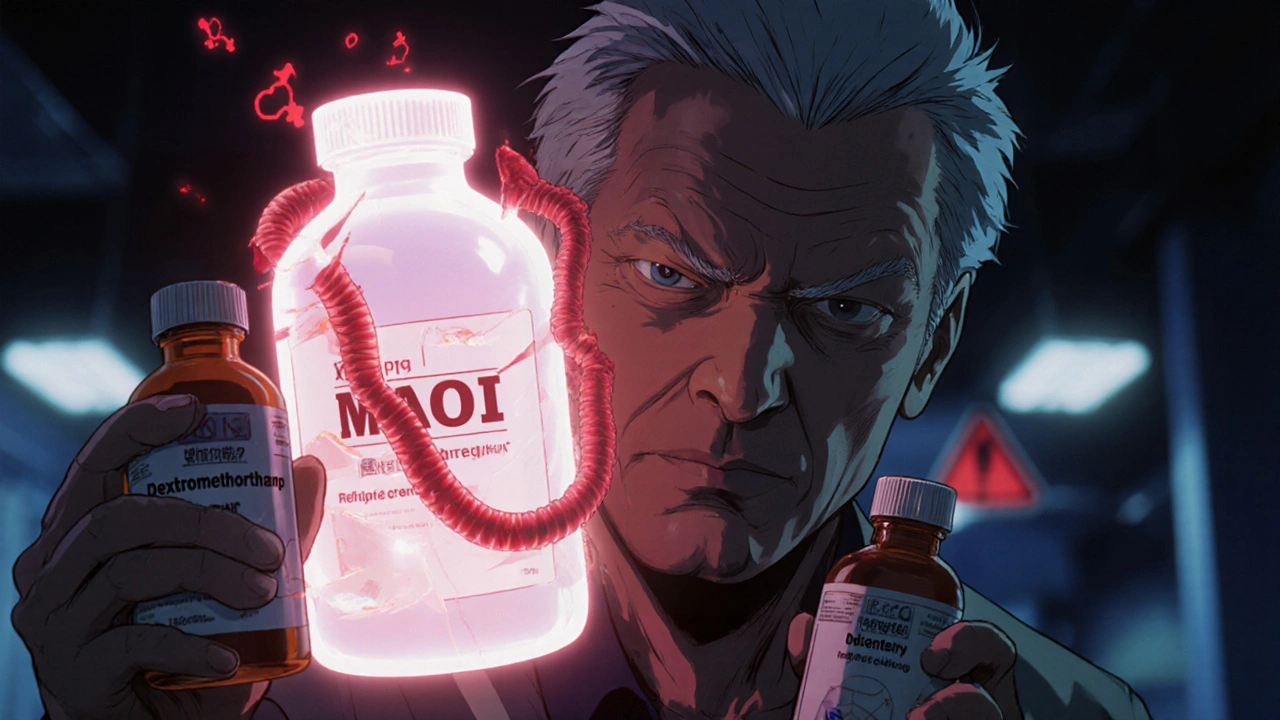MAOI-Dextromethorphan Wait Time Calculator
Dextromethorphan Safety Calculator
Safe to take dextromethorphan
It's safe to take dextromethorphan now. You can use cough medicine without serotonin syndrome risk.
Recommended alternative: Guaifenesin (Mucinex), honey, or steam therapy for cough relief.
Not Safe to Take Dextromethorphan
You must wait until before taking dextromethorphan.
This is because MAOIs stay active in your body for at least 14 days, and taking dextromethorphan too soon can cause serotonin syndrome - a life-threatening condition.
It’s easy to grab a bottle of cough syrup when you’ve got a cold. But if you’re taking an MAOI for depression or Parkinson’s, that simple act could put you in the hospital-or worse. Dextromethorphan, the active ingredient in popular brands like Robitussin, Delsym, and NyQuil, is safe for most people. But when mixed with monoamine oxidase inhibitors (MAOIs) like phenelzine, tranylcypromine, or selegiline, it can trigger a life-threatening condition called serotonin syndrome.
What Happens When Dextromethorphan Meets MAOIs?
Dextromethorphan works by calming the cough reflex in your brain. But it also has a hidden effect: it blocks serotonin reuptake. That means more serotonin sticks around in your brain. MAOIs do something similar-they stop your body from breaking down serotonin. When you take both together, serotonin builds up fast. Too much. Dangerous levels.
Serotonin syndrome isn’t just a bad headache. It’s a medical emergency. Symptoms can show up in as little as 6 hours. You might feel agitated, confused, or have rapid heart rate. Your muscles could lock up. You might develop a fever over 104°F. In severe cases, seizures, kidney failure, or even death can occur. About 2% to 12% of people with severe serotonin syndrome don’t survive, even with treatment.
The risk isn’t theoretical. Between 2010 and 2022, the FDA recorded 237 cases of serotonin syndrome linked to dextromethorphan and MAOIs. Nearly half of those cases required hospitalization. One Reddit user on r/MAOI shared how they ended up in the ER after taking cough syrup while on selegiline: “Extreme confusion, muscle rigidity, 104°F fever.” Another told PatientsLikeMe they couldn’t speak clearly after just four hours. They called it luck they survived.
Why Is This Interaction So Dangerous?
It’s not just serotonin. Dextromethorphan is broken down by an enzyme in your liver called CYP2D6. MAOIs can slow down that process, causing dextromethorphan to build up in your blood-sometimes by 300% to 400%. That means even a normal dose of cough syrup can act like a much stronger one.
And it’s not just MAOIs. Other common medications like fluoxetine (Prozac), paroxetine (Paxil), and even some heart drugs like quinidine can also interfere with CYP2D6. If you’re on an MAOI and take one of these too, the risk multiplies. The Therapeutic Goods Administration of Australia warns that combining dextromethorphan with any CYP2D6 inhibitor is risky-and many people don’t realize their antidepressant or blood pressure pill is one of them.
Doctors and pharmacists have known about this since at least 1976, when the FDA’s cough and cold panel first issued a warning. Yet, a 2021 study found only 38% of over-the-counter dextromethorphan labels clearly state the MAOI risk. Most people assume “OTC” means “safe with everything.” That’s a deadly assumption.
Who’s at Risk?
MAOIs aren’t used as often as SSRIs, but they’re still prescribed-especially for treatment-resistant depression, atypical depression, or Parkinson’s disease. About 1.2 million Americans take them each year. Many of them are older adults, who are also more likely to use cough medicine for winter colds.
Here’s the problem: most patients don’t know their medication interacts with cough syrup. A 2019 survey found 78% of people on MAOIs had no idea common cold medicines contained dextromethorphan. Even worse, only 43% of patients starting MAOI therapy get proper counseling about OTC risks.
And it’s not just adults. Teens sometimes misuse dextromethorphan for its hallucinogenic effects at high doses. But even at normal doses, the interaction with MAOIs can be fatal. There’s no safe threshold when these two drugs are combined.

How Long Should You Wait?
You can’t just stop your MAOI and take cough syrup the next day. MAOIs stick around in your system longer than most people think. The rule is simple: wait at least 14 days after your last dose before taking dextromethorphan. Some guidelines say 2 weeks. That’s not a suggestion-it’s a requirement.
Why? Because MAOIs irreversibly block the enzyme that breaks down serotonin. Your body needs time to make new enzymes. Until then, even small amounts of dextromethorphan can overload your system. If you’re switching from an MAOI to another antidepressant, your doctor will give you a washout period. Don’t skip it. Don’t guess.
And if you’ve taken dextromethorphan recently? Wait before starting an MAOI. Same rule applies. The clock starts when you stop the cough medicine, not when you feel better.
What Can You Take Instead?
You don’t have to suffer through a cough. There are safer options:
- Guaifenesin (Mucinex): This loosens mucus. It doesn’t affect serotonin. Look for products that say “no dextromethorphan.”
- Honey: A teaspoon of honey at bedtime is as effective as dextromethorphan for nighttime coughs in adults and children over 1 year old. Just make sure it’s pure honey-some blends contain tyramine, which can also interact with MAOIs.
- Steam and hydration: Warm fluids, humidifiers, and rest help your body recover naturally.
- Saline nasal spray: Helps with post-nasal drip, which often triggers coughing.
Always check the label. Some “all-in-one” cold formulas mix guaifenesin with dextromethorphan. Read the ingredients list. If you see “dextromethorphan,” “DM,” or “DXM,” put it back.

What Should You Do If You Accidentally Mix Them?
If you’ve taken both and start feeling off-rapid heartbeat, high fever, stiff muscles, confusion-go to the ER immediately. Don’t wait. Don’t call your doctor first. Serotonin syndrome can kill faster than you think.
Emergency treatment includes stopping both drugs, cooling the body, giving IV fluids, and sometimes using medications like cyproheptadine to block serotonin. In severe cases, patients need intensive care. Some don’t make it, even with treatment.
Bring the medicine bottle with you. Tell the staff exactly what you took and when. That saves time-and possibly your life.
How to Stay Safe
Here’s how to avoid this interaction for good:
- Know your meds. If you’re on an MAOI, make a list of all your medications-including vitamins and supplements-and review it with your pharmacist every 6 months.
- Check every OTC label. Look for “dextromethorphan,” “DM,” or “DXM.” If you’re unsure, ask the pharmacist. Don’t rely on the front of the box.
- Use a drug interaction checker. Apps like Medscape or GoodRx let you scan barcodes or type in names to check for risks. Use them before buying anything.
- Carry a medical alert card. If you’re on an MAOI, keep a small card in your wallet that says: “On MAOI. Avoid dextromethorphan, SSRIs, tramadol.”
- Ask before taking anything new. Even “natural” remedies can interact. Some herbal cough syrups contain ingredients that boost serotonin.
Pharmacists are your best defense. A 2021 study showed pharmacist counseling cut accidental dextromethorphan-MAOI combinations by 67%. Don’t be shy. Ask. It’s their job.
The Bigger Picture
This isn’t just about cough syrup. It’s about how we treat OTC medications. We treat them like candy-safe, harmless, inconsequential. But dextromethorphan is a drug. And like all drugs, it has risks. Especially when mixed with others.
The FDA is working on stronger warning labels. The European Medicines Agency now requires printed guides listing brand names of dextromethorphan products. But until those changes are fully rolled out, the responsibility falls on you.
If you’re on an MAOI, treat every OTC medicine like a prescription. Read the label. Ask questions. Don’t assume. Because when it comes to dextromethorphan and MAOIs, there’s no room for error.
Can I take dextromethorphan if I stopped my MAOI a week ago?
No. You must wait at least 14 days after your last dose of MAOI before taking dextromethorphan. MAOIs stay active in your system longer than you might think. Even after a week, the enzyme-blocking effect is still present, and dextromethorphan can trigger serotonin syndrome. Waiting less than two weeks is unsafe.
Is it safe to use honey instead of dextromethorphan for cough?
Yes, honey is a safe and effective alternative for cough relief in adults and children over 1 year old. It works as well as dextromethorphan for nighttime coughs. Just make sure it’s pure honey without added ingredients. Some flavored or blended honey products may contain tyramine, which can interact with MAOIs, so check the label.
What if I accidentally took dextromethorphan while on an MAOI?
If you’ve taken both and feel any symptoms-rapid heartbeat, high fever, muscle stiffness, confusion, or hallucinations-go to the emergency room immediately. Don’t wait. Call 911 or have someone take you. Serotonin syndrome can progress quickly and become fatal within hours. Bring the medicine bottle with you so doctors know exactly what you took.
Are all cough medicines unsafe with MAOIs?
No. Only those containing dextromethorphan are dangerous. Guaifenesin (Mucinex), saline sprays, and plain honey are safe alternatives. But many cold medicines combine multiple ingredients. Always check the active ingredients list. If it says “dextromethorphan,” “DM,” or “DXM,” avoid it. Products labeled “for congestion” or “for sinus” may contain pseudoephedrine, which can also raise blood pressure in MAOI users-so read carefully.
Do newer MAOIs like moclobemide have less risk?
Yes. Newer reversible MAOIs like moclobemide carry a much lower risk of serotonin syndrome with dextromethorphan. Only one case has been reported worldwide with moclobemide and dextromethorphan, compared to over 180 with older, irreversible MAOIs like phenelzine. But even with moclobemide, caution is advised. Always check with your doctor before combining any medication.


Sarah Cline
November 1, 2025 AT 12:32Just got back from the pharmacy and almost grabbed a bottle of NyQuil. Thank you for this post. I’m on phenelzine and had no idea dextromethorphan was in so many cold meds. I read the label now-every single time. This could’ve been me.
Sierra Thompson
November 2, 2025 AT 11:00The tragedy isn’t just the interaction-it’s the normalization of OTC as ‘harmless.’ We treat medicine like grocery items. But serotonin isn’t a suggestion. It’s a biological threshold. Cross it, and your body doesn’t ask permission. It just shuts down.
Khaled El-Sawaf
November 3, 2025 AT 08:11It’s irresponsible to assume patients will read labels. Most don’t. And pharmacists are overworked and underpaid. The FDA should mandate red, bold, 14-point font on every bottle: ‘DANGER: MAOI INTERACTION. DO NOT USE.’ No exceptions. No ‘maybe.’ This isn’t a suggestion-it’s a legal requirement waiting to happen.
Musa Aminu
November 4, 2025 AT 19:33USA got it wrong again. You people treat medicine like candy and then wonder why you’re dying. In Nigeria, we ask the pharmacist before we even pick up a pill. No guessing. No ‘it’s just OTC.’ You think you’re smart because you Google? You’re just lucky you’re still breathing.
Robert Andersen
November 5, 2025 AT 02:09There’s a deeper issue here: we’ve outsourced our health literacy to corporations. Labels are designed to sell, not to warn. ‘Cough Relief’ sounds benign. ‘Dextromethorphan’ sounds like a sci-fi drug. The language is weaponized against the uninformed. And the people who need the warning the most? They’re the ones least likely to understand it.
Eric Donald
November 6, 2025 AT 22:46One thing I’ve learned since starting selegiline: never assume. Even if it’s ‘natural,’ ‘herbal,’ or ‘homeopathic.’ I once bought a honey-based cough drop labeled ‘no artificial ingredients.’ Turned out it had a trace of tyramine. I spent three hours in the ER because I trusted the front of the box. Now I scan every barcode with Medscape. It’s not inconvenient-it’s life-saving.
Brenda Flores
November 7, 2025 AT 19:46Thank you so much for sharing this vital information. I am a registered nurse and I cannot tell you how many times I’ve seen patients come in with serotonin syndrome after taking over-the-counter remedies. Please, please, please-do not underestimate the danger. Even one dose can be fatal. Always consult your pharmacist. Always. Your life matters more than your cough.
Jackie R
November 8, 2025 AT 20:31People who take MAOIs are just asking for trouble. Why not just switch to something normal like Zoloft? Then you won’t have to live like a paranoid hermit. If you can’t handle basic safety, don’t take the drug.
Josh Arce
November 10, 2025 AT 04:15Lmao. Dextromethorphan? That’s just cough syrup. You’re telling me I can’t take Robitussin because I’m on some old-school antidepressant? Bro. I’ve been on phenelzine for 5 years. I’ve had 3 colds. I took DM every time. Still here. Maybe it’s just not that bad?
Eli Grinvald
November 11, 2025 AT 05:51😭 I’m on selegiline patch and just realized I bought a box of DayQuil last week. I didn’t even look. Thank you for this. I’m throwing it out. And yes, I’m crying. I feel so stupid. But also… grateful.
Carly Smith
November 11, 2025 AT 22:52Why are we even talking about this? Just don’t take cough syrup. Or take honey. Or breathe. Or something. Why does everything have to be a medical emergency? I hate when people overreact to OTC stuff. It’s not that hard to just not buy it.
Kurt Stallings
November 12, 2025 AT 00:57MAOIs are obsolete. If you’re still on them, you’re either a biochemist or a masochist. The real issue is outdated pharmacology being propped up by institutional inertia. Dextromethorphan is fine. It’s the medical establishment that’s the problem.